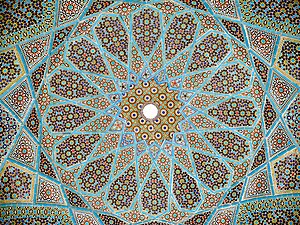Ali Hujwiri
Abu ’l-Ḥasan ʿAlī b. ʿUthmān b. ʿAlī al-Ghaznawī al-Jullābī al-Hujwīrī (November 1009– 25 September 1072) ʿAlī al-Hujwīrī or al-Hujwīrī (also spelt Hajweri, Hajveri, or Hajvery) for short, or reverentially as Shaykh Syed ʿAlī al-Hujwīrī or as Dātā Ganj Bakhsh by Muslims of the Indian subcontinent, was an 11th-century Iranian Sunni Muslim mystic, theologian, and preacher from Ghazna, who became famous for composing the Kashf al-maḥjūb (Unveiling of the Hidden), which is considered the "earliest formal treatise" on Sufism in Persian. Ali Hujwiri is believed to have contributed "significantly" to the spread of Islam in South Asia through his preaching, with one historian describing him as "one of the most important figures to have spread Islam in the Indian subcontinent." In the present day, Ali Hujwiri is venerated as the patron saint of Lahore, Pakistan by the traditional Sunni Muslims of the area. He is, moreover, one of the most widely venerated saints in the entire Indian subcontinent, and his tomb-shrine in Lahore, popularly known as Data Darbar, is one of the most frequented shrines in South Asia.





Quotes
edit- Knowledge is immense and life is short: therefore it is not obligatory to learn all the sciences, such as Astronomy and Medicine, and Arithmetic, etc., but only so much of each as bears upon the religious law: enough astronomy to know the times (of prayer) in the night, enough medicine to abstain from what is injurious, enough arithmetic to understand the division of inheritances and to calculate the duration of the Iddat.
- Kashf ul Mahjoob, Chapter I, Affirmation of Knowledge, p. 80
- The ostentatious man purposely acts in such a way as to win popularity, while the Malàmatí purposely acts in such a way that the people reject him. Both have their thoughts fixed on mankind and do not pass beyond that sphere.
- Persian Sufi Poetry, p. 73,
- A Literary History of Persia, Vol. III, p. 141-146, also quoted in Jan Rypka's History of Iranian Literature, p. 254
The Sayings and Teachings of the Great Mystics of Islam (2004)
edit(Muhammad Riaz Qadiri: The Sayings and Teachings of the Great Mystics of Islam, Gujranwala, Pakistan, 2004)
- Every good and evil that happens to man is decreed by God.
- p.98
- Implore God to deliver you from the wickedness of your soul.
- p.98
- Whosoever refrains his soul from lust, verily Paradise shall be his abode.
- p.98
- The spiritual path is hard to travel except for those who were created for the purpose.
- p. 98
- God alone can help a man to do good deeds.
- p. 98
- All humans action and inaction is the act and creation of God.
- p. 98
- In our time the science of Sufism is desolate.
- p. 98
- The people are occupied with following their lusts and have turned their back on the path of spiritualism.
- p. 98
- Blind conformity had taken the place of spiritual enthusiasm.
- p. 98
- The universe is an abode of Divine mysteries, which are deposited in created things.
- p. 98
See also
editExternal links
edit- Kashf ul Mahjoob, The Oldest Persian Treatise On Sufism, translated by Reynold A. Nicholson, London, 1911
- The Persian treatise of Sufism, Kashf ul Mahjoob: Justice Pir Muhammad Karam Shah Al-Azhari (1918 –1998), Zia-ul-Quran Publications, Lahore, 2001
- Edward G. Browne: A Literary History of Persia, Vol. III, London, 1902-1925
- J. T. P. De Bruijn: Persian Sufi Poetry, Curzon Press, Surrey, United Kingdom, 1997
- Jan Rypka: History of Iranian Literature, Dordrecht (South Holland), 1968
- Muhammad Riaz Qadiri: The Sayings and Teachings of the Great Mystics of Islam, Gujranwala, Pakistan, 2004